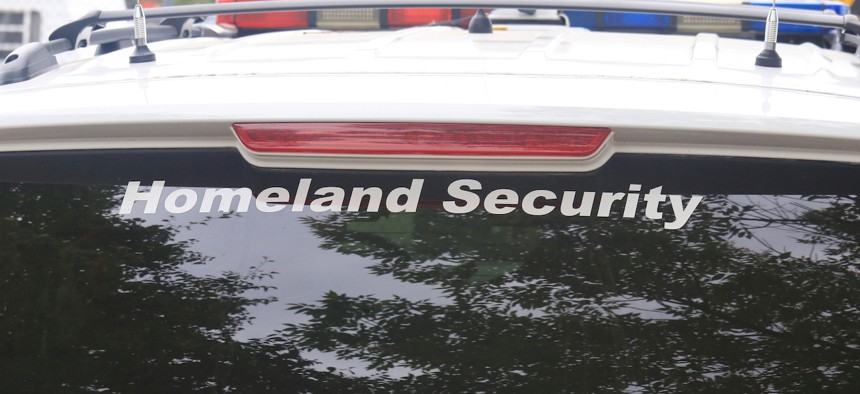
The fiscal 2024 appropriations measure would boost the overall allocation for the Homeland Security Department by 3%, compared to President Biden’s request to decrease spending at the agency by 1%. Douglas Sacha/Getty Images
Pay Raises and Hiring Are Where Lawmakers Agree in DHS Spending BiIl
Other common ground on the Homeland Security Department's spending levels is harder to come by.
The federal border agency would receive a flood of funding for new staff and airport screeners would see boosted pay under a funding bill House Republicans advanced on Thursday.
The fiscal 2024 appropriations measure would boost the overall allocation for the Homeland Security Department by 3%, compared to President Biden’s request to decrease spending at the agency by 1%. Customs and Border Protection would see its funding spike by $3.2 billion, a nearly 20% jump, over both the current fiscal year and Biden’s request. Democrats on the panel voice voted against the bill, but praised Republican leaders for working with them to include some bipartisan provisions.
The White House is currently negotiating with House Republicans over fiscal 2024 spending levels as part of a separate deal to increase the nation's debt ceiling, meaning final appropriations are likely to shift from Republicans’ current bill. Rep. Rosa DeLauro, D-Conn., the top Democrats on the House Appropriations Committee, criticized Republicans for moving forward with the DHS bill before announcing the allocations for each of the 12 annual spending bills. House Republicans have vowed to slash overall discretionary spending in fiscal 2024, meaning the increase for DHS—in conjunction with promised boosts for the departments of Veterans Affairs and Defense—would require even more severe cuts at the remaining federal agencies under the Republican plan.
The measure would fund 22,000 Border Patrol agents, providing nearly $500 million to up the staff from its current level of just more than 19,000. Biden had requested an increase of 350 agents after receiving funding for 300 new hires for the current fiscal year.
Even when prioritized, Border Patrol has struggled for years to add to its rolls as candidates have failed screening exams and positions in remote areas have remained difficult to fill. House Republicans earlier this month passed the 2023 Secure the Border Act that would set the floor for Border Patrol agents at 22,000.
“That tells you it’s a crisis,” Rep. Kay Granger, R-Texas, said of the staffing level supported by the spending bill.
Rep. Henry Cuellar, D-Texas, said the measure was “not the bill I would’ve written,” but contained a lot of bipartisan provisions that resulted from a fruitful behind-the-scenes process. He praised the legislation for including directives for DHS to submit budget execution and hiring plans and for new provisions to help CBP get to 100% vehicle screening at ports of entry.
Cuellar, the top Democrat on the DHS funding panel, criticized Republicans for including $2.1 billion for border wall construction and for failing to provide U.S. Citizenship and Immigration Services adequate resources to address their backlogs. The bill would give USCIS $122 million next fiscal year, a 55% cut compared to its current funding level and dramatically shy of Biden’s request for nearly $750 million.
Republicans highlighted that the measure would slash $188 million for DHS’ ongoing headquarters consolidation at the St. Elizabeth campus in Washington and deny the White House’s requests for nearly $100 million for electric vehicle infrastructure, $5 million to establish a Chief Diversity and Inclusion Office and $3 million for climate change initiatives. The bill would increase daily detention capacity at Immigration and Customs Enforcement to 41,000 individuals, 16,000 more than Biden’s proposal, while funding nearly 300 new ICE detention and removal officers.
As Biden has requested, the measure would provide nearly $900 million to the Transportation Security Administration to boost the pay of the agency’s screeners. Rep. Dave Joyce, R-Ohio, who authored the legislation, said the bill would offer “a much needed pay raise to provide compensation parity with other federal employees and to stabilize TSA’s workforce.”
The measure must still pass the full committee before heading to the House floor. The bill could become obsolete before that time, however, as the White House and congressional Republicans work toward a deal that could install spending caps for fiscal 2024. Lawmakers will then have to determine allocations for each of the 12 annual spending bills within those caps, a process that has typically played out in the Senate as that chamber requires bipartisan approval for passage.







